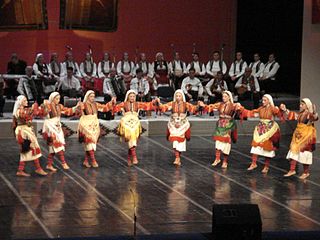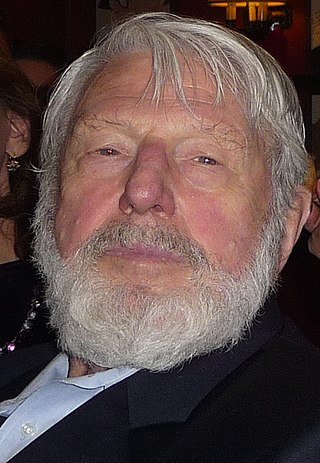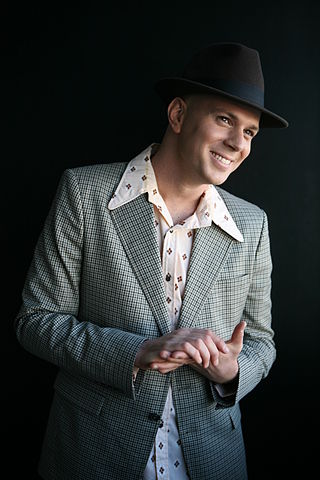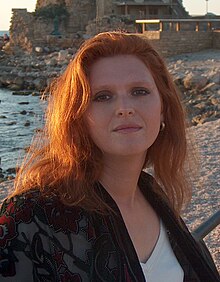
Hora, also known as horo and oro, is a type of circle dance traditionally performed in Southeast Europe. Circle dances with similar names are found in Bulgaria, Romania, Moldova, North Macedonia, Greece and culturally adopted by ethnic minorities such as the Ashkenazi Jews, Sephardic Jews and the Roma.

Theodore Meir Bikel was an Austrian-American actor, singer, musician, composer, unionist, and political activist.
Girlyman was an American folk-rock band formerly based in Brooklyn, New York City, New York, later based in Atlanta, Georgia. Its 2003 self-released debut album, Remember Who I Am, sold 5,000 copies before it was re-released by Daemon Records, the independent record label run by Amy Ray of the Indigo Girls. Girlyman described its musical style as "harmony-driven gender pop" and "leading-edge three-part harmony folk-pop," and enjoyed a strong following in the gay community.

Abraham Sutzkever was an acclaimed Yiddish poet. The New York Times wrote that Sutzkever was "the greatest poet of the Holocaust."

William Joel MacDonald Plaskett is a Canadian rock musician and songwriter based in Halifax, Nova Scotia. He was a member of Halifax alternative rock band Thrush Hermit in the 1990s. Plaskett performs in a number of genres, from blues and folk to hard rock, country, and pop.

Chava Alberstein is an Israeli musician, lyricist, composer, and musical arranger. She moved to Israel in 1950 and started her music career in 1964. Alberstein has released over sixty albums in Hebrew, English, and Yiddish. She is known for her liberal activism and advocacy for human rights and Arab-Israeli unity, which has sometimes stirred controversy, such as the ban of her song "Had Gadya" by Israel State Radio in 1989. Alberstein has received numerous accolades, including the Kinor David Prize, the Itzik Manger Prize, and honorary doctorates from several universities.

Jewish dance is dance associated with Jews and Judaism. Dance has long been used by Jews as a medium for the expression of joy and other communal emotions. Dancing is a favorite pastime and plays a role in religious observance.

The history of the Jews in Moldova reaches back to the 1st century BC, when Roman Jews lived in the cities of the province of Lower Moesia. Bessarabian Jews have been living in the area for some time. Between the 4th-7th centuries AD, Moldova was part of an important trading route between Asia and Europe, and bordered the Khazar Khaganate, where Judaism was the state religion. Prior to the Second World War, violent antisemitic movements across the Bessarabian region badly affected the region's Jewish population. In the 1930s and '40s, under the Romanian governments of Octavian Goga and Ion Antonescu, government-directed pogroms and mass deportations led to the concentration and extermination of Jewish citizens followed, leading to the extermination of between 45,000-60,000 Jews across Bessarabia. The total number of Romanian and Ukrainian Jews who perished in territories under Romanian administration is between 280,000 and 380,000.

Esther "Etti" Ankri is an Israeli singer-songwriter. She is a former Female Singer of the Year in Israel, and has also performed in the United States, England, and India. Ankri has been called a "rock genius", the "poet of Israeli spirituality," and "the contemporary voice of... Israel."
Jewish music is the music and melodies of the Jewish people. There exist both traditions of religious music, as sung at the synagogue and in domestic prayers, and of secular music, such as klezmer. While some elements of Jewish music may originate in biblical times, differences of rhythm and sound can be found among later Jewish communities that have been musically influenced by location. In the nineteenth century, religious reform led to composition of ecclesiastic music in the styles of classical music. At the same period, academics began to treat the topic in the light of ethnomusicology. Edwin Seroussi has written, "What is known as 'Jewish music' today is thus the result of complex historical processes". A number of modern Jewish composers have been aware of and influenced by the different traditions of Jewish music.
Beyond the Pale is a Toronto-based Canadian world/roots fusion band. Their style is rooted in klezmer, Balkan and Romanian music but heavily accented with contemporary and North American styles including bluegrass, jazz, reggae, funk and classical chamber music. They are known for unique songcraft, virtuosic musicianship, meticulous dynamics, and exuberant live performances. They are widely regarded as one of Canada's most accomplished and innovative acoustic ensembles. Some have described their sound as being in the same spirit as "New Acoustic Music" and David Grisman's "Dawg" music, but tinged more heavily with an east European accent. The name of the band is a reference to the Eastern-European Jewish Pale of Settlement, from where their music is partially inspired.
Mikhoel Felzenbaum is a postmodernist Yiddish novelist, poet and playwright.

Geta Burlacu is a Moldovan singer. She represented Moldova in the Eurovision Song Contest 2008 with the song "A Century of Love", written by Vica Demici and Oleg Baraliuc.
Vocolot is a contemporary Jewish women's a cappella ensemble based in California, USA.

Lea Koenig is an Israeli actress, nicknamed The First Lady of Israeli Theatre.

Yoni Eilat is an Israeli actor and singer.
The Songs of the Jewish Shtetle is a cultural musical project aimed at preserving Jewish cultural heritage. The project has gathered songs in Yiddish, a language put on the Red List of Threatened Languages by UNESCO. Before World War II, the number of native Yiddish speakers was approximately 11 million people. During the Holocaust, 6 million Jewish people were killed, thus the number of Yiddish speakers halved. The language continued in literature, oral speech, Ashkenazi folklore, and in songs. The project is as unique as the Jewish songs in Yiddish, which had been persecuted in various places that Jews had settled, and generally played only by small klezmer ensembles beforehand, were for the first time performed by a large symphony orchestra.

Li-Ron Choir is an Israeli award-winning choir. Its repertoire includes classical music, folk songs, Jewish and Israeli music.

Boris Sandler is a Yiddish-language author, journalist, playwright and lyricist and the former editor of the Yiddish edition of the Forward.

Anthony Mordechai Tzvi Russell is an American singer and musician who performs in Yiddish. He is an African-American convert to Judaism.















